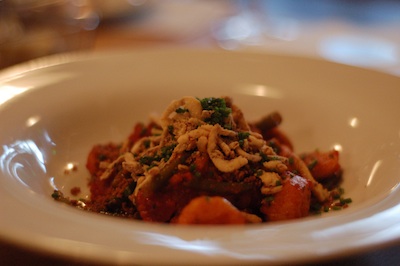By Joel Magalnick , Editor, JTNews
I tasted the shilshka at Stopsky’s Delicatessen just a few hours after our waiter had. The Eastern European dish is one of the half-dozen selections on the Mercer Island restaurant’s new dinner menu that debuted this week, and oh, was it good.
If you’re not familiar with shilshka, you won’t believe what you’ve missed all these years. Think gnocchi, but instead of being potato based, the soft, chewy balls of pasta are made with ground matzoh meal. Stopsky’s take on the dish makes it much less heavy than its Italian counterpart. The shilshka sat in an Armenian braised green bean and tomato sauce known as fassoulia, and saba, a dressing made from a grape-must reduction, and not (as we originally thought) mackerel or the chef’s grandfather, which cut the acidity of the tomato to near perfection. Topping the dish, and adding a necessary herbed kick, were shallots coated in matzoh meal and fried. One caveat: As good as it was, the residual oil on those last couple of shilshka overpowered what was left.
My dining companion David ordered the pan-seared chicken breast. “The skin was the high point,” he said. “Crispy, dense and flaky, which seems impossible to do.”
The quartered bird came bathed in a grilled corn-tomato broth and a mix of lima beans, which David said was a perfect accent. And he loved the requisite starch, a mellow, ricotta-filled kreplach, even more than the fried, brisket-filled dumplings he ordered as an appetizer.
The seared albacore tuna dish has many personalities: Its namesake arrived coated in matzoh meal and black peppercorns. On the side sat more tuna, flaked and poached in extra-virgin olive oil and served on a bed of greens with plum tomatoes in a lemon preserve. Third on the plate was Chinese eggplant, fried and breaded in the same matzoh meal as the seared tuna, and served with a red-pepper hummus that was so light and sweet you’d think Chef Austin Zimmerman snuck in some sugar. He didn’t, he assured me — all of the sweetness came from the peppers.
While the hummus and eggplant went well together on their own, they felt a bit discordant from the two tunas. Both preparations were delicious — the seared had just the right amount of kick from the pepper, and the poached was light enough to be perfect for the hot summer evening. But why did we need two? To maximize the amount of fish on the plate and remain at the $25 price point, the kitchen needed to get creative. Still, the poached version felt like overkill to me. There’s no reason it couldn’t stand on its own as an appetizer.
As an aside, David told me he’d steal my keyboard if I didn’t mention the steakon, the deli’s non-pig answer to bacon. Stopsky’s maple cures a beef short rib, smokes it overnight, then serves it fried, either on burgers or as an occasional sandwich special with lettuce and tomato.
“To be able to have that flavor and not have that Jewish guilt,” he said. Though the steakon isn’t bacon, keep in mind that it (and the rest of the deli’s offerings) are not kosher.
This new menu is great. No question about it. But is it deli? Stopsky’s bills itself as “tradition, updated,” taking old deli favorites and updating them as local, sustainable dishes that meet the demands of the modern palate. At the same time, people who want deli want their deli: They want the smoked fish and pickles at the counter, which they get. They want their bagels and black-and-white cookies, which they get. They want pastrami on rye with the meat piled to the ceiling, which they get. Those old standbys are on this new dinner menu, incidentally. And the chicken soup, which Stopsky’s originally served as a modern variation when it opened last year, is now the most traditional item they offer.
Yet take the new shilshka dish: To compare the painstaking preparation and Mediterranean-style sauce to Ballard’s Golden Beetle, for example, or to some vinyl-coated, overlit joint on the Lower East Side, the Stopsky’s needle points decidedly toward the Beetle.
Owner Jeff Sanderson told me his goal with the restaurant is to celebrate Jewish heritage in all its forms, and unlike other parts of the country, that means a nod to Seattle’s Sephardic roots.
“Jewish food is a living, breathing thing,” he said. “The deli in Houston is not the deli in Seattle is not the deli in Minneapolis.”
We should be thankful for that, whatever you call it.
